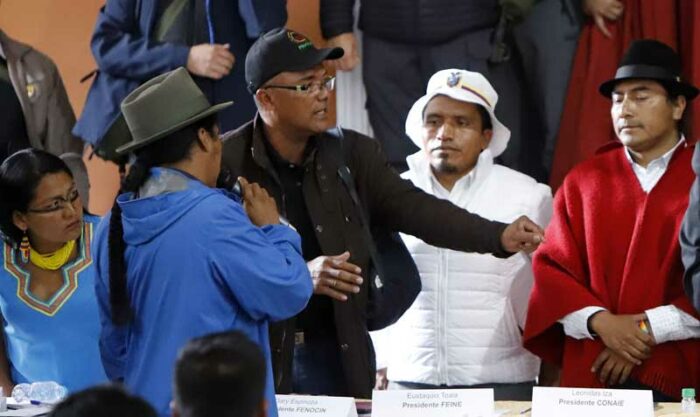The National Confederation of Peasant, Indigenous and Black Organizations (Fenocin) is reaffirming its plan of mobilizing against the Government, even when a state of exception is in force in three coastal provinces: Guayas, Esmeraldas and Santo Domingo. The Guayaquil Chamber of Commerce is rejecting the mobilization.
The organization says it will mobilize —block the roads— on November 15, 2022, but that it could suspend that activity if the Executive decides to decree the forgiveness of debts (by Monday, November 7th) — at a level that was not agreed to in the dialogues between the government that were held for 90 days after the June 2022 national strike that shut down the country.
The Ministry of Government called a meeting at 12:00 p.m. on Monday to discuss the issue, according to the National leader, Luis Mullo. The president of the Fenocin, Gary Espinoza, has warned since October 25th that if there is no response to the demand, they would take to the streets.
The Government has already decreed the cancellation of debts of up to $3,000, but according to Lullo that has not yet happened and there is unrest in the Fenocin bases on the Coast.
“We never renounced the right to resistance for the fact of having attended the dialogue. We put in our effort, but if the government is not willing to attend [to our demands], we have to find ways to continue demanding,” he reiterated, confirming that the decision to mobilize “remains firm.”
Franklin Columba, president of the Union of Intercultural Social Organizations of the South of Pichincha, a subsidiary of Fenocin, said that it is not a collective decision.
Fenocin is requesting that article 196 of the Organic Law for Economic Development and Fiscal Sustainability be complied with. It provides that public financial entities forgive credits of up to $10,000.
The Fenocin leaders say that the remission is included in the final act of agreements signed with the Government on July 18th, at the public and private Banking table. Fenocin claims that in that document it was established that the provisions of the article will be complied with.
Coordination table
Fenocin is one of the three indigenous organizations whose representatives are on the monitoring commission, along with government delegates, to oversee the implementation of agreements reached at the 10 dialogue tables.
In their last meeting on November 1st, they defined the schedule to review the agreements by tables. The Ministry of Government indicated that a follow-up matrix will be validated at the next meeting. Mullo says Fenocin’s position is that the measure is independent of what happens at the monitoring table because only general guidelines will be established there.
Miguel Ángel González, president of the Guayaquil Chamber of Commerce (CCG), believes that citizens will not approve a new mobilization due to the negative effects left by the June national strike.
“We cannot allow a minority group to violently impose a specific request,” he insisted, suggesting that if there are pending issues, they should continue the dialogue and reach an intermediate point.
He said that companies are recovering but sees that the state of emergency with the curfew is a blow to the economy. Business premises have to reduce their opening hours, before they already did it for fear of insecurity, according to González.
His expectation is that the Decree discourages mobilization, at least in the provinces it governs. However, Fenocin says it will protest even considering this limitation.
González lamented that the Decree came into effect during the holiday as it affects sales.
Political analyst Alfredo Espinoza says not respecting the 45-day state of emergency will undermine the mobilization and fertilize the scenario that is already “highly conflictive.”
“Fenocin is wrong in not waiting for the agreements to become operational in the implementation phase, there is a nostalgia among the leaders towards violence, they seek to pay for the decomposition of the regime and expose themselves because there is a pre-electoral scenario,” he claimed.


0 Comments